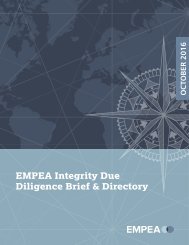Create successful ePaper yourself
Turn your PDF publications into a flip-book with our unique Google optimized e-Paper software.
Busan and Doha have been advancing recently, but better marketing could move them further. With the exception <strong>of</strong><br />
Casablanca, the African centres could improve a bit with better marketing, but marketing is not their core problem. Overall,<br />
the primary need is to focus on improving the business environment.<br />
4. HOW AFRICAN CENTRES CAN IMPROVE<br />
4.1 Evolution <strong>of</strong> a Traditional Financial Centre<br />
During other research, the GFCI model has been run to identify what sequence increases competitiveness from 200 points<br />
on the index to 800 points on the index. Before we<br />
start to examine each <strong>of</strong> the five competitive areas,<br />
it’s important to recognise that a criterion that<br />
helped to cause success may not be particularly<br />
strong today, but set in train a sequence <strong>of</strong> positive<br />
events. For instance, low taxation might draw<br />
participants in, but not persist. Likewise, a criterion<br />
that is strong and important today, for instance, the<br />
availability <strong>of</strong> skilled personnel, may be an effect<br />
rather than a cause. Still, using the predictive model<br />
at various GFCI ratings, we can see what matters at<br />
each stage.<br />
First, infrastructure. Infrastructure is all the stuff<br />
that’s taken for granted. In major financial centres,<br />
many things are assumed, for instance, reliable<br />
electricity supplies and water, an absence <strong>of</strong> natural threats such as hurricanes or flooding, basic internet connectivity. Yet<br />
London used to have significant flood risk, and may again as the Thames Barrier comes to the end <strong>of</strong> its projected usefulness.<br />
Up to 400 points on the scale, basic ‘infrastructure’ matters. You can’t have a financial centre without basic infrastructure.<br />
While it might appear that infrastructure ceases to matter after 400 points, it’s rather the contrary. Infrastructure tends to<br />
get taken for granted as it grows in line with wealth and expectations, yet is crucial. Stuart Fraser at the City <strong>of</strong> London<br />
Corporation said, “You don’t get to the top by being complacent. You have to be somewhat paranoid.” [“On Top Of The<br />
World,” Sunday Times, 9 October 2009].<br />
Second, from roughly 400 to 600 points, ‘business environment’ is what matters. There’s no point in building infrastructure<br />
and being open for business without having fundamental market activity. It’s at this point that things such as setting up a<br />
stock exchange might make a difference. There are many ways <strong>of</strong> saying, “we’re open for business,” but commitment, simple<br />
financial laws, regulations efficiently and consistently applied and an open banking and investment regime get things going.<br />
Third, starting after business environment, but before human capital, is ‘financial sector development.’ This means providing<br />
the panoply <strong>of</strong> financial sector regulation, connections, and training that prove a commitment to having a financial sector.<br />
The fourth area <strong>of</strong> competitiveness, from 600 to 800 points, is ‘human capital.’ This may seem oddly late, after all people<br />
are the most important bit <strong>of</strong> finance, no? However, the going only starts to get tough after 600 points as more and more<br />
advanced skills are required to win and transact more and more complex transactions – transactions <strong>of</strong> advanced financial,<br />
structural or legal complexity in multiple languages. One could argue that this area is ‘split,’ i.e., good basic education is<br />
part <strong>of</strong> infrastructure, but later an emphasis on the skills and qualifications needed for financial services begins to dominate.<br />
Finally, ‘reputational and general’ factors matter from 600 points. After 800 points, and here we’re at the edge <strong>of</strong> our data<br />
envelope, it appears that infrastructure may start to matter again. However, throughout the climb from 200 to 800, business<br />
<strong>Conduits</strong> <strong>of</strong> <strong>Capital</strong> – Onshore Financial Centres and Their Relevance to African Private Equity<br />
| 129





